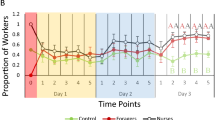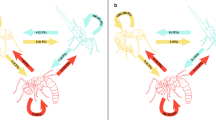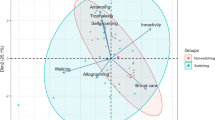Abstract
Social animals exhibit well-organized task allocation among group members. In ants, a large group of eusocial Hymenoptera, the division of labor among workers is maintained by behavioral flexibility, providing robustness against fluctuating environmental conditions. Under stable conditions, worker tasks shift from the inside (e.g., nurses) to the outside (e.g., foragers) of the nest as age increases along this gradient. If the colony’s age structure is unbalanced, some workers compensate for vacant tasks, regardless of their age. However, such behavioral flexibility mechanisms are not clearly described in most ant species. In this study, using the ant Diacamma sp. from Japan, we focused on task reversion (i.e., foragers shifting to nursing roles, reverted nurses). By intermittent observation, we examined how the proportion of trials detected outside the nest of foragers, as foragers’ behavioral propensity, impacts task reversion when caste composition is significantly altered. We revealed that foragers with low proportion were the most likely to become reverted nurses, suggesting that the worker propensity is strongly correlated to task reversion. Moreover, task allocation among workers emerged on day 2 after colony disturbance, suggesting that the division of labor can promptly reconstruct when the age structure of the colony is accidentally altered by external factors. It also illustrates the importance of behavioral propensity in maintaining social systems. We also discussed the mechanisms of flexible task allocation among the workers in terms of self-organized process.
Significance statement
In eusocial Hymenoptera (e.g., wasps, honeybees, and ants), the division of labor is maintained by workers’ behavioral flexibility, which is itself driven by the needs of the colony. However, the detailed mechanisms underlying ant behavioral flexibility remain unclear. Focusing on task reversion in foragers shifting to nursing roles regardless of their age-dependent assigned task, we revealed that behavioral propensity strongly affects task reversion in the Diacamma sp. As ant colonies generally have an unbalanced age structure and inhabit unstable environments, behavioral flexibility is thought to be important to maintain the division of labor. Moreover, our study could be applied to examining molecular and physiological basis of task reversion in ant species.





Similar content being viewed by others
References
Amdam GV, Norberg K, Fondrk MK, Page RE (2004) Reproductive ground plan may mediate colony-level selection effects on individual foraging behavior in honey bees. Proc Natl Acad Sci 101:11350–11355. https://doi.org/10.1073/pnas.0403073101
Bates D, Maechler M, Bolker B, Walker S (2013) Lme4: linear mixed- effects models using Eigen and S4. R package version 1.0-5 edn, http://CRAN.R-project.org/package=lme4
Bernadou A, Busch J, Heinze J (2015) Diversity in identity: behavioral flexibility, dominance, and age polyethism in a clonal ant. Behav Ecol Sociobiol 69:1365–1375. https://doi.org/10.1007/s00265-015-1950-9
Beshers SN, Fewell JH (2001) Models of division of labor in social insects. Annu Rev Entomol 46:413–440. https://doi.org/10.1146/annurev.ento.46.1.413
Bonabeau E, Theraulaz G, Deneubourg JL (1996) Mathematical model of self-organizing hierarchies in animal societies. Bull Math Biol 58:661–717. https://doi.org/10.1016/0092-8240(95)00364-9
Bourke AFG, Franks NR (1995) Social evolution in ants. Princeton University Press, Princeton
Brooks ME, Kristensen K, van Benthem KJ et al (2017) glmmTMB balances speed and flexibility among packages for zero-inflated generalized linear mixed modeling. R J 9:378–400
Calabi P, Traniello JFA (1989) Behavioral flexibility in age castes of the ant Pheidole dentata. J Ins Behav 2:663–677. https://doi.org/10.1007/BF01065785
Camazine S, Deneubourg JL, Franks NR, Sneyd J, Theraula G, Bonabeau E (2001) Self-Organization in Biological Systems. Princeton University Press, Princeton
Corona M, Libbrecht R, Wurm Y, Riba-Grognuz O, Studer RA, Keller L (2013) Vitellogenin underwent subfunctionalization to acquire caste and behavioral specific expression in the harvester ant Pogonomyrmex barbatus. PLoS Genet 9:e1003730. https://doi.org/10.1371/journal.pgen.1003730
Crall JD, Gravish N, Mountcastle AM, Kocher SD, Oppenheimer RL, Pierce NE, Combes SA (2018) Spatial fidelity of workers predicts collective response to disturbance in a social insect. Nat Commun 9:1–13. https://doi.org/10.1038/s41467-018-03561-w
Dussutour A, Simpson SJ (2008) Description of a simple synthetic diet for studying nutritional responses in ants. Ins Soc 55:329–333. https://doi.org/10.1007/s00040-008-1008-3
Fujioka H, Abe MS, Fuchikawa T, Tsuji K, Shimada M, Okada Y (2017) Ant circadian activity associated with brood care type. Biol Lett 13:13–16. https://doi.org/10.1098/rsbl.2016.0743
Fukumoto Y, Abe T, Taki A (1989) A novel form of colony organization in the ‘queenless’ ant Diacamma rugosum. Physiol Ecol Jpn 26:55–61
Gadau J, Fewell J (2009) Organization of Insect Societies: From Genome to Socio-complexity. Harvard University Press, Cambridge
Gordon DM (1989) Dynamics of task switching in harvester ants. Anim Behave 38:194–204. https://doi.org/10.1016/S0003-3472(89)80082-X
Hartig F (2020) DHARMa: residual diagnostics for hierarchical (multi-level/mixed) regression models. R package version 0.3.1. https://CRAN.R-project.org/package=DHARMa
Herb BR, Wolschin F, Hansen KD, Aryee MJ, Langmead B, Irizarry R, Amdam GV, Feinberg AP (2012) Reversible switching between epigenetic states in honeybee behavioral subcastes. Nat Neurosci 15:1371–1373. https://doi.org/10.1038/nn.3218
Johnson BR (2003) Organization of work in the honeybee: a compromise between division of labour and behavioural flexibility. Proc R Soc B 270:147–152. https://doi.org/10.1098/rspb.2002.2207
Kikuchi T, Nakagawa T, Tsuji K (2008) Changes in relative importance of multiple social regulatory forces with colony size in the ant Diacamma sp. from Japan. Anim Behav 76:2069–2077. https://doi.org/10.1016/j.anbehav.2008.08.029
Kohlmeier P, Feldmeyer B, Foitzik S (2018) Vitellogenin-like A associated shifts in social cue responsiveness regulate behavioral task specialization in an ant. PLoS Biol 16:e2005747. https://doi.org/10.1371/journal.pbio.2005747
Maynard Smith J, Szathmáry E (1995) The major transitions in evolution. Oxford University Press, Oxford
Moreau CS, Bell CD, Vila R, Archibald B, Pierce NE (2006) Phylogeny of the ants: diversification in the age of angiosperms. Science 312:101–104. https://doi.org/10.1126/science.1124891
Nakata K (1995) Age polyethism, idiosyncrasy and behavioural flexibility in the queenless ponerine ant, Diacamma sp. J Ethol 13:113–123. https://doi.org/10.1007/BF02352570
Nakata K (1996) Does behavioral flexibility compensate or constrain colony productivity? Relationship among age structure, labor allocation, and production of workers in ant colonies. J Ins Behav 9:557–569. https://doi.org/10.1007/BF02213880
Oster GF, Wilson EO (1978) Caste and ecology in social insects. Princeton University Press, Princeton, NJ
Oxley PR, Ji L, Fetter-Pruneda I, McKenzie SK, Li C, Hu H, Zhang G, Kronauer DJ (2014) The genome of the clonal raider ant Cerapachys Biroi. Curr Biol 24:451–458. https://doi.org/10.1016/j.cub.2014.01.018
Peeters C, Crewe R (1984) Insemination controls the reproductive division of labour in a ponerine ant. Naturwissenschaften 71:50–51. https://doi.org/10.1007/BF00365989
Ravary F, Lecoutey E, Kaminski G, Châline N, Jaisson P (2007) Individual experience alone can generate lasting division of labor in ants. Curr Biol 17:1308–1312. https://doi.org/10.1016/j.cub.2007.06.047
Robinson EJH, Feinerman O, Franks NR (2009) Flexible task allocation and the organization of work in ants. Proc R Soc B 276:4373–4380. https://doi.org/10.1098/rspb.2009.1244
Robinson EJH, Feinerman O, Franks NR (2012) Experience, corpulence and decision making in ant foraging. J Exp Biol 215:2653–2659. https://doi.org/10.1242/jeb.071076
Ronibson GE (1992) Regulation of division of labor in insect societies. Annu Rev Entomol 37:637–665. https://doi.org/10.1146/annurev.en.37.010192.003225
Seid MA, Traniello JFA (2006) Age-related repertoire expansion and division of labor in Pheidole dentata (Hymenoptera: Formicidae): a new perspective on temporal polyethism and behavioral plasticity in ants. Behav Ecol Sociobiol 60:631–644. https://doi.org/10.1007/s00265-006-0207-z
Shimoji H, Abe MS, Tsuji K, Masuda N (2014) Global network structure of dominance hierarchy of ant workers. J R Soc Interface 11:20140599. https://doi.org/10.1098/rsif.2014.0599
Shimoji H, Aonuma H, Miura T, Tsuji K, Sasaki K, Okada Y (2017) Queen contact and among-worker interactions dually suppress worker brain dopamine as a potential regulator of reproduction in an ant. Behav Ecol Sociobiol 71:35. https://doi.org/10.1007/s00265-016-2263-3
Theraulaz G, Bonabeau E, Denuebourg JN (1998) Response threshold reinforcements and division of labour in insect societies. Proc R Soc B 265:327–332. https://doi.org/10.1098/rspb.1998.0299
Tripet F, Nonacs P (2004) Foraging for work and age-based polyethism: the roles of age and previous experience on task choice in ants. Ethology 110:863–877. https://doi.org/10.1111/j.1439-0310.2004.01023.x
Ulrich Y, Saragosti J, Tokita CK, Tarnita CE, Kronauer DJ (2018) Fitness benefits and emergent division of labour at the onset of group living. Nature 560:635–638. https://doi.org/10.1038/s41586-018-0422-6
Wakano JY, Nakata K, Yamamura N (1998) Dynamic model of optimal age polyethism in social insects under stable and fluctuating environments. J Theor Biol 193:153–165. https://doi.org/10.1006/jtbi.1998.0697
Wilson EO (1971) The insect societies. Belknap Press, Cambridge
Wurm Y, Wang J, Riba-Grognuz O, Corona M, Nygaard S, Hunt BG, Ingram KK, Falquet L, Nipitwattanaphon M, Gotzek D, Dijkstra MB (2011) The genome of the fire ant Solenopsis invicta. Proc Natl Acad Sci 108:5679–5684. https://doi.org/10.1073/pnas.1009690108
Acknowledgments
We thank Kazuki Tsuji and Yoh Iwasa for the discussion; Hajime Yaguchi, Tatsuma Sato, and Rio Yamashita for collecting the ant colonies; Romain Libbrecht and an anonymus reviewer for very helpful comments.
Funding
This work is supported by a Grant-in-Aid for Early-Career Scientists to HS (no. 18K14798); Scientific Research (A) to HS (no. 15H02652); Scientific Research (B) to MKH (no. 18H02512); the Inamori Foundation to MKH; the Hyogo Science and Technology Association to MKH.
Author information
Authors and Affiliations
Corresponding author
Additional information
Communicated by W. Hughes
Publisher’s note
Springer Nature remains neutral with regard to jurisdictional claims in published maps and institutional affiliations.
Rights and permissions
About this article
Cite this article
Shimoji, H., Kasutani, N., Ogawa, S. et al. Worker propensity affects flexible task reversion in an ant. Behav Ecol Sociobiol 74, 92 (2020). https://doi.org/10.1007/s00265-020-02876-3
Received:
Revised:
Accepted:
Published:
DOI: https://doi.org/10.1007/s00265-020-02876-3




